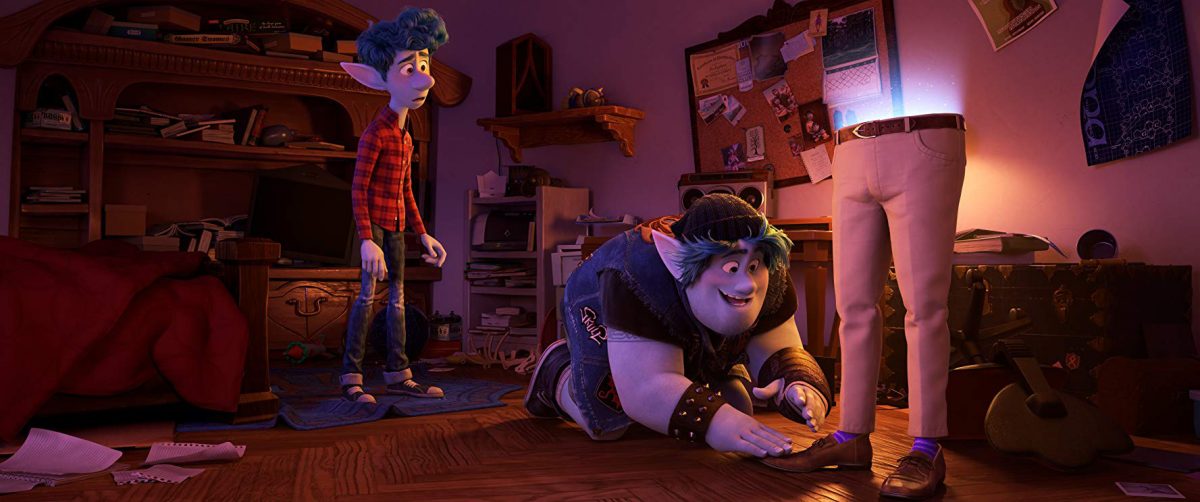The positive reviews for “Onward” have seemed to damn it with faint praise; it’s good but not excellent, they say, or not quite up the level of the best of Pixar. And, even if I sometimes waver on full enthusiasm for the studio’s output, I’ll admit that “Onward” is immediately noticeable for a strangely discursive surface-level sheen to its world-building. The set-up is a familiar one for animated films – what if a human-like world was inhabited by some non-human entity. Enter the mythical creatures of “Onward”. Their world is like ours, except its filled with centaurs, manticores, cyclops, fauns, pixies and – the creatures that are the focal point for this story – elves. The conceit that propels the narrative is that after decades of advancement in technology these mythical creatures have lost touch with their magic. There’s no need for effortful wizardry when technology can solve everything. Except that set-up is peripheral to the story that “Onward” wants to tell, and because of its peripheral nature it’s a conceit that feels lacking in specificity. Throughout the film, “Onward” often nods to – but rarely examines – the implications of this. The idea is that magic is known but no longer practiced, and there’s a slight looseness to the world-building that makes the stakes of the world feel slightly negligible as opposed to something like “Coco” – the last non-sequel entry from the studio.
The mention of “Coco” is not accidental, though. Like that film this is also a film about a quest where death permeates the narrative structure. Ian is a nerdy elf who celebrates his sixteenth birthday despondent and friendless, yearning for the father he never met. His mother, now remarried, tries her best to manage his loneliness but the situation is complicated by his well-meaning but exhausting older brother Barley, whose devotion to uncovering the historical magic of the past world leave him completely removed from the reality of the current one. A sixteen-year old gift from their deceased father promises a reprieve though – a tiny bit of magic that can bring their lost father back just for one day. But the magic is too much for the boys and rather than returning a full body, they are only able to recover a pair of sentient legs and must go on a quest to find a magical stone that will help them recover the rest of the body because, since this is a quest, in 24 hours the magic runs and the magic that brought their father back will give out. Despite the magic at the centre, though, there’s not much that emphatically ties the story to this world, leaving “Onward” – despite its charms – feeling like a story that seems only incidental to the world it exists in.
There’s a dissonance at its centre, and it’s possible that dissonance is intended. There’s the schism between the features of the world, and the very specific smallness of the story that it’s telling. And then there’s the disparity between the two characters who must carry the weight of the film on its quest. Tom Holland is an able voice-actor, but “Onward” is another in a long line of films that seems unable to harness his natural effervescent charm, instead milling it down to something along the lines of affable-nerd. Ian is complex enough to justify our focus on him. Which leaves Chris Pratt who voices the older, irrepressible, Barley volleying an exuberance of energy that tilts the scales of the union in the first half of the film. The situation improves as it goes along, though, more on the backs of the actors than the film’s characterisation, which occasionally feels stilted.
So, the charm of “Onward” is less in the specificity of its characterisations as the film is littered with a variety of types more than uniquely discernible people. Nonetheless, the voice-work all around is dependable, with Octavia Spencer as a nervous manticore and Pratt as best in show. The charm of it all comes more from the possibilities it portends. With the two brothers joined by the pair of sentient legs, “Onward” challenges our ideas of what family relationships look like and how they are form. It’s a scenario that sets up complicated questions for a film ostensibly aimed at children. It’s a film that has more ideas than its 100-minute running time can truly distil, but it’s commitment to avoiding easy answers is compelling. Even when the narrative beats it examines are familiar, there’s an immediate maturity to its willingness to confronting uncomfortable themes in sincere ways – if anything, it’s that dichotomy between the film’s underbelly of aching sadness and its inability to complete demit itself from being fun that is its true crutch. There’s a prerequisite tear-jerker moment where its clear director Dan Scanlon (who co-writes the film with Jason Headley and Keith Bunin) want the audience to be moved, and I admit – despite my occasional hesitance on subscribing to Pixar’s brand of emotional jerking I was moved. Yet, what stuck out is the film’s own inability to have its characters experience the same emotional catharsis that the audience is expected to.
“Onward” is caught between excavating tough emotions while offering a product where the characters are forced to remain buoyant – there are at least three key moments where emotions of anger or sadness are interrupted to move to the next story beat. It gets its job done and presents themes and questions that are interesting to consider, and if it feels too ambitious for its own good, it’s doing more than most of the other films currently in theatres.



